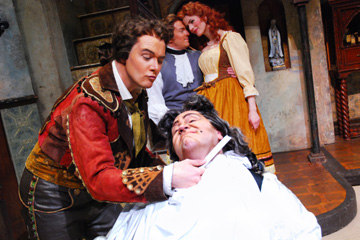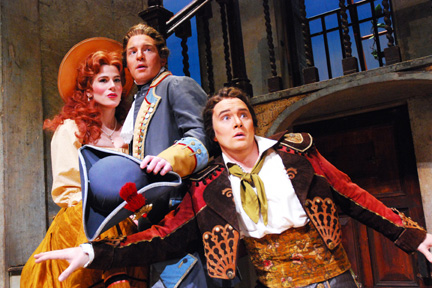Virginia Opera’s
The Barber of Seville
Honors Rossini
By Gabriela Ramírez-Carr
April 2009
Review: The Barber of Seville (Il Barbiere di Siviglia)
By Gioachino Rossini (1792-1868)
Libretto by Cesare Sterbini (1784-1831)
The Virginia Opera at George Mason University
Conductor: Peter Mark
 Photo/Anne M. Peterson The Virginia Opera’s production of “The Barber of Seville,” with left to right: Jason Detwiler as Figaro, Steven Condy as Dr. Bartolo, and in the background, John Zuckerman as Count Almaviva and Manon Strauss Evrard as Rosina. |
Il Barbiere di Siviglia by Gioachino Rossini (1792-1868) is one of the greatest and most enduring comic operas of all time, which even Beethoven, who was not a great fan of Italian opera, enjoyed. “Give us more Barbers!” he told Rossini, when the Italian composer visited Beethoven in Vienna. The Virginia Opera Company has a mission to bring grand opera to as wide an audience as possible, and the group travels across the Commonwealth of Virginia in this effort. Their production at George Mason University in Fairfax County in April 2009 of the Barber of Seville lived up to these ideals, and succeeded in transmitting both the light-hearted comedy, as well as powerful ideas.
After nearly 200 years, the popularity of this opera still continues to grow, like a building crescendo in a Rossini overture. Thanks to the conductor and artistic director, Peter Mark, we all knew from the opening measures that a great comedy was about to unfold. Figaro’s vocally demanding introduction, “Largo al factotum,” is considered opera’s most internationally recognized aria, and the role of Rosina has to be one of the most coveted roles in the operatic profession. The opera opens with tenor John Zuckerman as Almaviva, accompanied by musicians about to serenade Rosina at her balcony window. Zuckerman has a beautiful light tenor voice and insightful acting skills. He gave himself over completely to portraying his role, and especially worth mentioning was his appearance in Act II disguised as the substitute music teacher. Although his voice lacked the necessary volume in some of the duets and ensemble pieces, his artistry overshadowed this problem.
Figaro (baritone Jason Detwiler) enters with his famous aria commanding the stage with his great agile voice and comedic acting, despite the unnecessary distraction of three young scantily-clad women dancing around him. When done correctly, Figaro can infect the audience with his wordplay and his exuberant zest for life—and Mr. Detwiler was superb, especially given the staging there. Almaviva expresses his interest in Rosina and hires Figaro to devise a plan to win the heart of the girl.
Soprano Manon Strauss Evrard, as Rosina, stole the limelight with her unforgettable coloratura voice as she introduces herself by singing “Una voce poco fa” telling us that she is docile and obedient, BUT—she can be a viper when challenged. Rossini always demanded “voce, voce, voce” from his bel-canto singers, and he would surely be delighted to see the caliber of Ms Strauss Evrard’s polished sound and great accuracy of articulation which is so critical in any Rossini piece.
Against this flowering love story is the baritone Steven Condy as the old Dr. Bartolo who keeps his ward, Rosina, as a virtual prisoner hoping to marry her. Condy meets the challenges of a very demanding role with full-bodied phrasing and the ability to deliver every nuance of voice and expression. Coming to his aide is the cynical, corrupt music teacher, Don Basilio (bass, Mark McCrory) who convinces Dr. Bartolo to use slander to destroy his young rival. McCrory’s thunderous lower register filled the entire auditorium in “la calunnia,” as he conveyed the sinister power of slander, as the oldest, dirtiest, and possibly the most effective tool to destroy a targeted person. The oligarchy had used it against political enemies for centuries1, and in fact, they still do.
Rossini’s Serious Opera Buffa
Rossini was a prolific composer who wrote with astounding speed. By age 20 he already enjoyed celebrity status, and had six successful operas. Starting as a child, Rossini had music lessons from private tutors and ended his studies at the conservatory at Bologna. However, most believe his biggest influence came from years of scoring symphonies and quartets of Mozart and Haydn. Even as a teenager he was such a devoted follower of Mozart that his nickname was “il Tedeschino” or “the little German.”
Clearly Rossini was familiar with Mozart’s opera, “The Marriage of Figaro,” based on the second of the trilogy by Pierre-Augustin Caron de Beaumarchais (1732-1799) composed 30 years before Rossini’s Barber of Seville. Rossini was determined to use Beaumarchais’ first play, which was already familiar to opera-goers in the early 19th century, since the well established composer Giovanni Paisiello (1740-1816), had already composed an opera based on it. Rossini changed the title to “Almaviva or The Useless Precaution,” and while Paisiello’s opera enjoyed wide popularity in its time, it was rapidly eclipsed by Rossini’s opera.
 Photo/Anne M. Peterson The Virginia Opera’s production of “The Barber of Seville,” left to right: Manon Strauss Evrard is Rosina, John Zuckerman is Count Almaviva and Jason Detwiler is Figaro. |
Rossini’s “Barber of Seville” was considered the quintessential “opera buffa” of all time. Like Mozart, Rossini shows his genius in his ability to unite the comic and the serious in a single opera--in direct opposition to the prevailing Italian operatic tradition of the period. He encouraged humorous stage gestures throughout his works, but for Rossini, the true comedy must come from the music itself. For example, his overture begins with a somber minor chord, but a comic suspense quickly builds when the violins, and later the quickly repeated measures from the orchestra are added—all in an effort to prepare his audience for the farce to come. Another example of Rossini’s flexible use of humor is in Act II, where Figaro and Almaviva rescue Rosina and Figaro tries desperately to hurry the escape, but the young lovers can’t leave until they each finish their elaborate expressions of devotion to each other.
Beaumarchais’ Political Message
Beaumarchais was a member of the French secret service and a great supporter of the American Revolution. He operated a fleet of 40 ships that brought weapons, financial support, and supplies to the American Patriots. His writings had been banned or censored across much of Europe, and he had even been held as a political prisoner for a period. His play, The Barber of Seville, upset many in the aristocracy with its biting political and social commentary, where the main character, Figaro, a commoner, is secure and self-confident because of his inherent belief that he is the equal to any man. Using only his wit, the clever Figaro easily out-maneuvers the nobility, and even an otherwise powerful Count, is unable to achieve anything without Figaro first developing the plan, and then providing the leadership to complete the task. Mozart’s revolutionary Marriage of Figaro developed this theme earlier, and Rossini wanted to elaborate it in his Italian opera. This was one of the first operas to be performed in its original Italian in the New York opera houses.
While this is a thoroughly entertaining opera, Rossini’s true mission, as with any classical art form, is not to merely provide graceful melodies or amusing characters, but rather to uplift the audience to the level necessary to meet the challenges of the contemporary world. While not a profound composer and thinker like Mozart or Verdi, Rossini’s “Barber of Seville” gives the audience great insight and inspiration to discover for themselves the workings of society and the foibles of the characters who populate it.
In this spirit the Virginia Opera Company produced a great success which was loyal to the composer’s intent, with one exception. For some unknown reason, at the beginning of this performance as Figaro entered, there appeared three women wearing corsets and bloomers, mentioned above, which the director may have done for some purpose, but only served to distract. However, given the spectacular singing, acting, and otherwise good stage direction, I was won over.
Related
Music PageFootnotes:
1 This famous aria sung by Don Basilio explains to the virtues of slander as a very effective weapon against any enemy one may wish to destroy “from the inside.” Beaumarchais, Mozart, and other enemies of oligarchism were very familiar with the method developed in the aria below:
La calunnia è un venticello Piano piano, terra terra, Dalla bocca fuori uscendo, Alla fin trabocca e scoppia, E il meschino calunniato, |
Slander is a little breeze, Very softly, quite prosaically, Exiting from the mouth Finally it issues forth and bursts, And the miserable victim of slander, |
